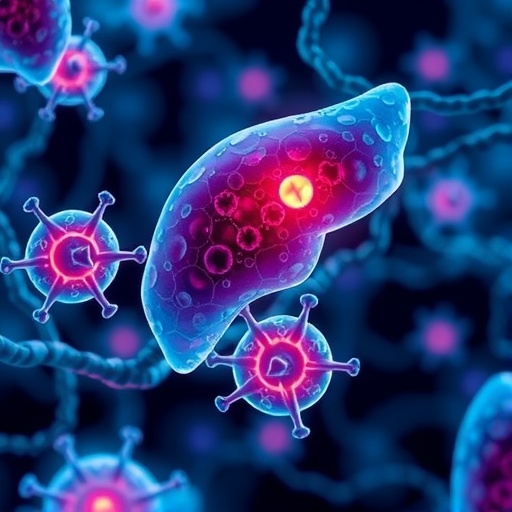In the evolving field of oncology, new discoveries are continually reshaping our understanding of how tumors interact with the immune system. A recent study led by Tang, BF and colleagues revealed intriguing findings regarding MELK (Maternal Embryonic Leucine Zipper Kinase) and its role in hepatocellular malignancies. The research offers a novel perspective on how MELK can prevent the adverse effects of radiofrequency ablation (RFA), a common therapeutic approach for liver cancer treatment. This article presents a deeper exploration of the implications of MELK in the context of immunogenic cell death and antitumor immune responses.
Radiofrequency ablation is a procedure that targets cancer cells by delivering heat through radio waves, effectively destroying the targeted tissue. However, while this technique can be effective in reducing tumor burden, researchers have discovered that it can also inadvertently induce immunogenic cell death (ICD). This type of cell death promotes immune responses, potentially leading to tumor regression. Nevertheless, the study suggests that MELK plays a crucial role in manipulating this process, effectively stabilizing FABP5 (Fatty Acid Binding Protein 5) and modulating immune responses during and after RFA.
In the research, the authors demonstrate that an overexpression of MELK is associated with improved survival rates in patients undergoing RFA for liver cancer. This correlation implies that MELK acts as a safeguard, protecting cancer cells from the drastic consequences of RFA-induced ICD. Specifically, the stabilization of FABP5 by MELK was identified as a significant mechanism in this protective response, illustrating a complex interplay between cellular signaling and immune evasion.
The study brings to light the necessity of comprehending the biological underpinnings of how tumor cells adapt to various treatments. One of the critical findings of the research is how MELK influences metabolic pathways within hepatocellular carcinoma cells. By understanding these mechanisms, researchers can pave the way for enhanced therapeutic strategies that do not compromise the immune response.
Another fascinating aspect of the research delves into the molecular pathways activated by MELK. By modulating FABP5, MELK is implicated in lipid metabolism regulation, which is crucial given that tumor cells often alter their metabolic processes to survive in harsh environments. This regulatory effect suggests that targeting MELK could provide dual benefits: reducing cancer cell viability and enhancing immune system efficacy against the tumor.
The experimental methodology adopted by the researchers enhances the validity of their findings. Employing both in vitro and in vivo models, they meticulously characterized tumor responses and immune profiles following RFA treatment in the presence of different MELK expression levels. This comprehensive approach strengthens the credibility of their conclusions, highlighting the importance of MELK as a prospective therapeutic target in hepatocellular malignancies.
Furthermore, the study also addresses the potential implications for future clinical applications. Given that MELK stabilizes FABP5 and subsequently influences tumor responses to immunogenicity, there’s a significant avenue to explore in identifying patients most likely to benefit from RFA based on MELK expression levels. Such stratification could lead to personalized treatment protocols, optimizing therapeutic outcomes for liver cancer patients.
Moreover, the results highlight an emerging need for innovative combinatorial strategies in cancer therapies. By integrating MELK inhibitors with traditional therapies like RFA, experts can harness the synergistic effects to improve overall treatment efficacy. It draws attention to the potential pitfalls of conventional therapies and underscores the necessity to reconsider treatment frameworks as we grapple with cancer’s resilience.
Looking beyond hepatocellular carcinoma, the implications of this research might extend to other malignancies where RFA is employed. Understanding MELK’s protective role could unveil new therapeutic targets that enhance treatments and immunotherapies across various cancers. Thus, this research not only enriches the existing knowledge within the field but also opens doors to a broader range of investigations.
In conclusion, the study conducted by Tang et al. elegantly underscores the intricate relationship between tumor biology and immunology, particularly in the context of radiofrequency ablation treatment. By revealing MELK’s essential role in mediating these interactions, exciting possibilities arise for improving therapeutic strategies and patient outcomes in the face of challenging cancers like hepatocellular carcinoma.
As researchers continue to dissect the complexities of cancer biology, the insights gained from the exploration of MELK provide a vital stepping stone for more innovative approaches in cancer treatment, faculty-based therapies, and personalized medicine. Advancing our understanding of such pathways will potentially revolutionize the landscape of oncology, paving the way for future breakthroughs that can save lives.
The findings of this research hold promise not just for optoelectronic oncology, but also for reshaping our approach to combative medicine as we harness the immune system more effectively against malignancies. Ongoing collaborations and further investigations will be essential to fully leverage the potentials of MELK and unravel the intertwined mechanisms that govern cancer treatment responses.
With such profound implications for patient-centric approaches, the research makes a significant contribution to the ongoing dialogue about how we can better equip ourselves to fight cancer. Leveraging breakthroughs like these can ultimately inspire innovation that redefines the future of cancer care and patient management.
Subject of Research: MELK’s role in preventing radiofrequency ablation-induced immunogenic cell death in hepatocellular malignancies.
Article Title: MELK prevents radiofrequency ablation-induced immunogenic cell death and antitumor immune response by stabilizing FABP5 in hepatocellular malignancies.
Article References:
Tang, BF., Xu, WT., Fang, SJ. et al. MELK prevents radiofrequency ablation-induced immunogenic cell death and antitumor immune response by stabilizing FABP5 in hepatocellular malignancies.
Military Med Res 12, 5 (2025). https://doi.org/10.1186/s40779-024-00588-7
Image Credits: AI Generated
DOI:
Keywords: MELK, radiofrequency ablation, immunogenic cell death, hepatocellular carcinoma, FABP5, cancer treatment, immunology, metabolic pathways, liver cancer, therapeutic strategies.
Tags: cancer immunotherapy advancementsFABP5 stabilization and cancerhepatocellular carcinoma treatmentimmune response modulation by MELKimmunogenic cell death in oncologyMELK and patient survival ratesMELK as a therapeutic target in cancerMELK role in liver cancerradiofrequency ablation and immune responsesradiofrequency ablation effectstherapeutic approaches for liver malignanciestumor immune interaction mechanisms





